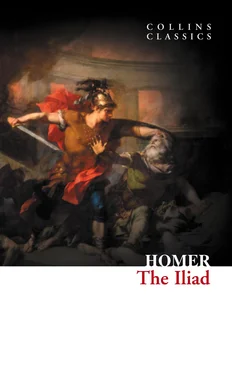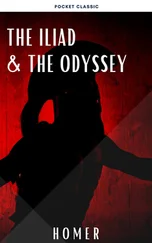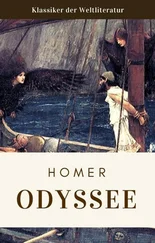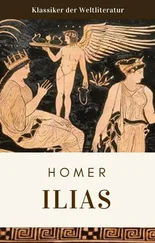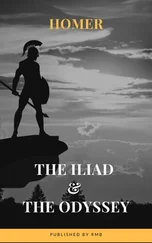And both her warlike lords outshined in Helen’s eyes?
This deed, thy foes’ delight, thy own disgrace,
Thy father’s grief, and ruin of thy race;
This deed recalls thee to the proffer’d fight;
Or hast thou injured whom thou dar’st not right?
Soon to thy cost the field would make thee know
Thou keep’st the consort of a braver foe.
Thy graceful form instilling soft desire,
Thy curling tresses, and thy silver lyre,
Beauty and youth; in vain to these you trust,
When youth and beauty shall be laid in dust:
Troy yet may wake, and one avenging blow
Crush the dire author of his country’s woe.”
His silence here, with blushes, Paris breaks:
“’Tis just, my brother, what your anger speaks:
But who like thee can boast a soul sedate,
So firmly proof to all the shocks of fate?
Thy force, like steel, a temper’d hardness shows,
Still edged to wound, and still untired with blows,
Like steel, uplifted by some strenuous swain,
With falling woods to strew the wasted plain.
Thy gifts I praise; nor thou despise the charms
With which a lover golden Venus arms;
Soft moving speech, and pleasing outward show,
No wish can gain them, but the gods bestow.
Yet, would’st thou have the proffer’d combat stand,
The Greeks and Trojans seat on either hand;
Then let a midway space our hosts divide,
And, on that stage of war, the cause be tried:
By Paris there the Spartan king be fought,
For beauteous Helen and the wealth she brought;
And who his rival can in arms subdue,
His be the fair, and his the treasure too.
Thus with a lasting league your toils may cease,
And Troy possess her fertile fields in peace;
Thus may the Greeks review their native shore,
Much famed for generous steeds, for beauty more.”
He said. The challenge Hector heard with joy,
Then with his spear restrain’d the youth of Troy,
Held by the midst, athwart; and near the foe
Advanced with steps majestically slow:
While round his dauntless head the Grecians pour
Their stones and arrows in a mingled shower.
Then thus the monarch, great Atrides, cried:
“Forbear, ye warriors! lay the darts aside:
A parley Hector asks, a message bears;
We know him by the various plume he wears.”
Awed by his high command the Greeks attend,
The tumult silence, and the fight suspend.
While from the centre Hector rolls his eyes
On either host, and thus to both applies:
“Hear, all ye Trojan, all ye Grecian bands,
What Paris, author of the war, demands.
Your shining swords within the sheath restrain,
And pitch your lances in the yielding plain.
Here in the midst, in either army’s sight,
He dares the Spartan king to single fight;
And wills that Helen and the ravish’d spoil,
That caused the contest, shall reward the toil.
Let these the brave triumphant victor grace,
And different nations part in leagues of peace.”
He spoke: in still suspense on either side
Each army stood: the Spartan chief replied:
“Me too, ye warriors, hear, whose fatal right
A world engages in the toils of fight.
To me the labour of the field resign;
Me Paris injured; all the war be mine.
Fall he that must, beneath his rival’s arms;
And live the rest, secure of future harms.
Two lambs, devoted by your country’s rite,
To earth a sable, to the sun a white,
Prepare, ye Trojans! while a third we bring
Select to Jove, the inviolable king.
Let reverend Priam in the truce engage,
And add the sanction of considerate age;
His sons are faithless, headlong in debate,
And youth itself an empty wavering state;
Cool age advances, venerably wise,
Turns on all hands its deep-discerning eyes;
Sees what befell, and what may yet befall,
Concludes from both, and best provides for all.
The nations hear with rising hopes possess’d,
And peaceful prospects dawn in every breast.
Within the lines they drew their steeds around,
And from their chariots issued on the ground;
Next, all unbuckling the rich mail they wore,
Laid their bright arms along the sable shore.
On either side the meeting hosts are seen
With lances fix’d, and close the space between.
Two heralds now, despatch’d to Troy, invite
The Phrygian monarch to the peaceful rite.
Talthybius hastens to the fleet, to bring
The lamb for Jove, the inviolable king.
Meantime to beauteous Helen, from the skies
The various goddess of the rainbow flies:
(Like fair Laodice in form and face,
The loveliest nymph of Priam’s royal race:)
Her in the palace, at her loom she found;
The golden web her own sad story crown’d,
The Trojan wars she weaved (herself the prize)
And the dire triumphs of her fatal eyes.
To whom the goddess of the painted bow:
“Approach, and view the wondrous scene below!
Each hardy Greek, and valiant Trojan knight,
So dreadful late, and furious for the fight,
Now rest their spears, or lean upon their shields;
Ceased is the war, and silent all the fields.
Paris alone and Sparta’s king advance,
In single fight to toss the beamy lance;
Each met in arms, the fate of combat tries,
Thy love the motive, and thy charms the prize.”
This said, the many-coloured maid inspires
Her husband’s love, and wakes her former fires;
Her country, parents, all that once were dear,
Rush to her thought, and force a tender tear,
O’er her fair face a snowy veil she threw,
And, softly sighing, from the loom withdrew.
Her handmaids, Clymene and Æthra, wait
Her silent footsteps to the Scaean gate.
There sat the seniors of the Trojan race:
(Old Priam’s chiefs, and most in Priam’s grace,)
The king the first; Thymoetes at his side;
Lampus and Clytius, long in council tried;
Panthus, and Hicetaon, once the strong;
And next, the wisest of the reverend throng,
Antenor grave, and sage Ucalegon,
Lean’d on the walls and bask’d before the sun:
Chiefs, who no more in bloody fights engage,
But wise through time, and narrative with age,
In summer days, like grasshoppers rejoice,
A bloodless race, that send a feeble voice.
These, when the Spartan queen approach’d the tower,
In secret own’d resistless beauty’s power:
They cried, “No wonder such celestial charms
For nine long years have set the world in arms;
What winning graces! what majestic mien!
She moves a goddess, and she looks a queen!
Yet hence, O Heaven, convey that fatal face,
And from destruction save the Trojan race.”
The good old Priam welcomed her, and cried,
“Approach, my child, and grace thy father’s side.
See on the plain thy Grecian spouse appears,
The friends and kindred of thy former years.
No crime of thine our present sufferings draws,
Not thou, but Heaven’s disposing will, the cause
The gods these armies and this force employ,
The hostile gods conspire the fate of Troy.
But lift thy eyes, and say, what Greek is he
(Far as from hence these aged orbs can see)
Around whose brow such martial graces shine,
So tall, so awful, and almost divine!
Though some of larger stature tread the green,
None match his grandeur and exalted mien:
He seems a monarch, and his country’s pride.”
Thus ceased the king, and thus the fair replied:
“Before thy presence, father, I appear,
With conscious shame and reverential fear.
Читать дальше
